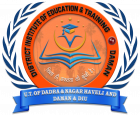branches
DIETS: ACADEMIC BRANCHES
DIETS: ACADEMIC BRANCHES
- In-service Field Interaction Innovation & Co-ordination
- District Resource Unit
- Curriculum Material Development and Evaluation
- Educational Technology
- Work Experience
- Planning & Management
- To identify training needs of Primary teachers, Upper Primary teachers, Secondary teachers, and Senior Secondary teachers in the district
- To organize in-service training programs to be held in and outside the DIET
- To serve as the nodal branch for organizing service education programs for teachers and HMs
- To conduct orientation programs for Resource Persons, who conduct in-service programs
- To evaluate and monitor the quality and efficacy of in-service programs and strive for their continuous improvement
- To serve as a reference and resource centres for teachers who wish to continue their education
- To act as the nodal branch for all action research and field interactions activities
- To co-ordinate in-house action research activities and disseminate its results
- To help in publishing periodic newsletter and magazines
- To assist educational authorities in planning and coordinating training programs
- To provide instructional inputs into core areas and individual subjects
- To evaluate and monitor the quality and efficacy of the training programs for NFE/AE personnel
- To undertake and develop curriculum, basic and post-literacy TLM, low-cost teaching aids and evaluation tools for AE/NFE
- To undertake field interaction and act as the referral unit for academic problems in AE/NFE
- To undertake action research in all areas
- To adapt existing curricular units and develop new locally relevant units for the district in various subjects
- To develop teaching – learning materials for general and locally developed curricular units
- To adopt innovative techniques and guidelines for continuous and summative learner evaluation
- To develop evaluation tools and techniques for diagnostic testing, remedial programs and talent identification procedures
- To undertake testing on sample basis to assess achievement levels among primary & upper primary learners and adult learners under NLM
- To help educational authorities and schools in implementing a reliable and valid system of learner evaluation
- To conduct workshops for the adaptation development work relating to CMDE
To provide CMDE related inputs into all other programs/activities of pre-service and in-service
- To develop simple, effective and low-cost teaching aids for elementary education
- To maintain all AV equipment of the institute and computer lab
- To maintain a display area for good & low-cost teaching aids
- To maintain a library of educational VCDs
- To lend and borrow slides, cassettes and films to other institutions
- To liaise with nearby radio station for arranging educational broadcasts
- To conduct in-service programs for teachers in the area of ET
- To conduct workshops for the development work
To provide ET related inputs into all programs/activities of pre-service and in-service branch
- To identify locally relevant Work Experience areas and develop sample curricular units, Teaching Learning Materials and Low-cost teaching aids
- To help educational authorities and schools in planned introduction of Work Experience activities
- To conduct appropriate in-service programs for teachers in the areas of Work Experience
- To organize activities for cleanliness, upkeep and development of the campus and for basic maintenance of furniture and other properties
- To organize and promote community service activities and study visits to work centres
- To maintain Workshop /Garden for Work Experience activities
- To promote work-related hobbies among teacher trainees
- To maintain an appropriate data-base for the district
- To conduct studies with a view to give policy advice to educational planners/administrators/DBE regarding UEE/NLM
- To study the effects of various interventions of the state
- To conduct studies in relation to enrolment, retention and regularity of attendance of children and adult learners
- To develop norms, criteria and techniques for evaluation of institutions
- To provide technical assistance to educational authorities in school mapping, micro-planning in UPE/UEE, formation and activation of school complexes, institutional planning and evaluation.
- To conduct appropriate programs for HMs, block level educational functionaries in P&M
